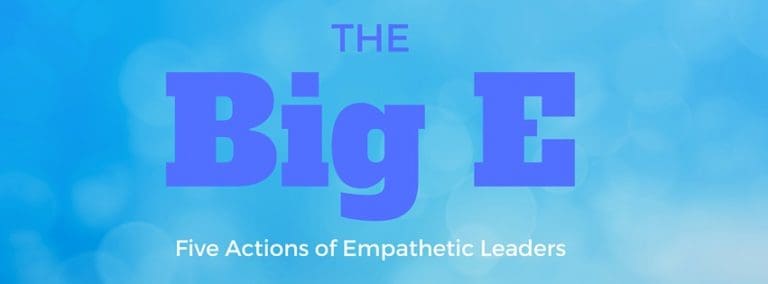There’s a lot of talk about the need for more empathy in the world. The Big E is on the lips of sociologists, neuroscientists, educators, activists, and life coaches. Not only is empathy a catalyst for building successful relationships, it’s a habit we can cultivate for better living.
Understanding the emotions and perspectives of others and using this understanding to guide our actions is at the core of empathetic leadership. Without empathy, says author Roman Krznaric, our societies would fall apart. “Although Twitter may have gotten people onto the streets for Occupy Wall Street and the Arab Spring, it can’t convince us to care deeply about the suffering of distant strangers,” writes Krznaric.
Empathy is a vital mindset for school leaders. Without it, people may perceive us as selfish, self-serving, or insensitive. Is it possible to become more empathetic when it’s not an attribute we display naturally? Can empathy be learned and refined? The short answer is yes! As a preeminent barometer of effectiveness, the Big E is actually a circuit in our brain. If damaged or ignored, it can hurt our ability to recognize what others need and feel.
Habits are everything in our line of work. When we become tired, overwhelmed, or stressed, we resort to our familiar ways. To be more mindful about the things we do habitually, consider five actions that build empathy. By strengthening these habits, we can raise group performance and approach our work as happier individuals. Pick one habit to develop or practice in the upcoming weeks.
- Ditch the Golden Rule. We all grew up with the golden rule imprinted in our brain: Do unto others as you would want done unto you. But people don’t want to be treated like you want to be treated. They want to be treated like they want to be treated. Empathetic leaders replace the Golden Rule with the Titanium Rule: Do unto others as they would want done unto them.
- Remove your mask. We face a lot of pressure to be perfect. There are folks everywhere watching and counting on us. To make connections, people need to see our vulnerabilities. When we share personal stories and open up about uncertainties, it lets people know we’re human.
- Get to know strangers. Empathetic people are interested in getting to know people outside their normal sphere of relationships. In this way, they encounter perspectives and worldviews that may be different than their own. Make it a goal to get to know a stranger every week. Perhaps it’s the person who delivers the school’s mail or the familiar face you see every day in the Starbucks line.
- Challenge conventional thinking. We have a lot of labels for students: disadvantaged, low-performing, affluent, high-achieving, etc. Yet, these labels often prevent us from appreciating diversity and creating meaningful levels of school connectedness and engagement. If we believe education is the great equalizer, then we have to make it truly equal by wearing the shoes of those who don’t look like us or think like us.
- Be wise with words. It’s hard to recover from a slip of the tongue or a slip of the keyboard. Empathetic leaders know how impactful their words can be. They are careful about what they say, how they say it, when they say it, and who they say it to.
Reference:
Krznaric, R. (2012, November). Six habits of highly empathetic people. Greater Good Science Center. Retrieved from http://greatergood.berkeley.edu/article/item/six_habits_of_highly_empathic_people1



